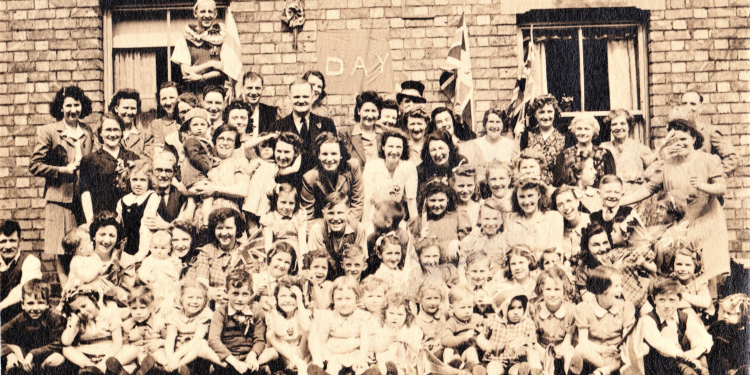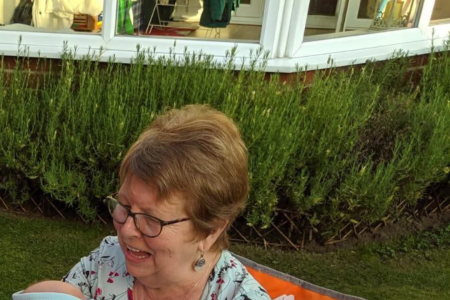To mark the 80th anniversary of VE Day, we are taking the opportunity to share the memories of that momentous time from some of the older people who use our services.
Gwen:
Gwen, 90, who attends Westminster 43 tea parties, was just four when World War Two started and she lived in Bermondsey, south London until 1941. Her family lost three homes in the German Blitz bombing raids and Gwen eventually went to stay with her grandmother.
When the air raids started, Gwen and her family would shelter under railway arches where beer barrels were stored: “Even today when I smell beer it reminds me of that time,” said Gwen, who now lives in St. Johns Wood, north London.
During one raid, Gwen’s family had to leave the shelter because a bomb had exploded near a petrol station. When they went back the following day to find her sister’s doll, they discovered it embedded in the wall of the shelter. After that they moved to Edgware Road and slept on platforms in the tube station. Gwen reminisces: “It was a bit like being in a village with a canteen, children’s play area with entertainment, a first aid centre, loos and so on. But some trains still ran through the night.”
Despite the disruption to her young life, Gwen managed to attend school and remembers being in Great Ormond Street Hospital having her tonsils removed with German aircraft flying overhead. “We just got on with being children, riding bikes, swinging round lamp posts on ropes,” she said.
Gwen was evacuated for a while to Wellingborough, Northamptonshire, before returning to London. By the time of VE Day on 8 May, 1945, she was 10-years-old. Her father had been collecting sixpence (two and a half new pence) a week from residents to pay for a street party where adults danced and children played. Gwen remembers: “The tables were laid out with all kinds of food and drink and there were flags and bunting. We all had a great time. “Dad even went to a local factory and bought presents for all the kids.”
Three months later when Japan surrendered and the war was finally over, Gwen’s family joined the massive crowds outside Buckingham Palace and in Trafalgar Square for the unparalleled celebrations.
Elizabeth
Elizabeth, 84, who is also a member of the Westminster 43 group, was living in Australia when VE Day was declared, and her father suggested she should keep newspaper articles about the momentous events. “I remember those pages well,” she said. “Then a little bit later I saw photos of the first ex-prisoners of war of the Japanese disembarking from the ships. They were just skin and bone. Some years later my Sunday Schol teacher who was an ex-POW was at a Sunday picnic and boys were throwing bread rolls at each other.
“He quietly reprimanded them and said ‘Don’t do that. I can’t bear to see food thrown around. I and my fellow prisoners would have given their right arms for that bread during the war.’”
Eric
Eric Ward’s father was one of those Prisoners of War. He was just five when he met his Bombardier dad, Russell, at Rhyl railway station for the first time. Russell had been held captive by the Japanese for three years when he was forced to work in a Taiwan copper mine in temperatures of 40C with acid water dripping on him. “It’s hard to remember my feelings on that day,” said Eric, 84, who attends a Re-engage activity group in Rhuddlan, Denbighshire, Wales. “But it was obviously a very big occasion. Me and mum were both excited.
“My big regret is that I never really asked about what he went through and it’s too late now. After his return he constantly suffered from chest problems, but we did manage to go out rabbiting, so we had some good times together. He had been a healthy sportsman before the war but by the time he got home he wasn’t at all well, which is not surprising. When the men were finally freed from the Japanese they were nothing but skeletons.”
During his first days of captivity Russell spotted another prisoner wearing a hat bearing the motif, “Sunny Rhyl.” They began talking and discovered both were from Rhuddlan. Eifion Roberts eventually returned home, like Russell, and they became lifelong friends, regularly enjoying a couple of whiskies in their local.
In 1992 Russell Ward died, taking the horrors of war with him to the grave. In 2017 Eric and wife Mair flew out to Taiwan to visit the site of the now closed mine where a memorial wall carries the names of the thousands of Allied soldiers who were tortured and forced to work there in inhumane conditions. “We arrived on Remembrance Day,” said Eric and there were dignitaries there from various countries, America, Canada, Australia, the UK. We saw dad’s name on the wall and then I made a short speech about how dad had suffered, how the men were beaten and given just two bowls of rice a day to survive on.
“It was a very emotional occasion and something I’ll never forget. Just like dad finding a friend in Eifion we have also made friends with other relatives who went there that day and we keep in touch.”
Joyce
Joyce, from Westminster, was 11 when war broke out. She remembers collecting shrapnel from bombs which had fallen on London streets and taking it to school where it was collected for recycling, along with railings and gates. Joyce, 97, also helped fill sandbags to protect buildings against bomb blasts.
She also witnessed ‘dog-fights’ between British and German fighter aircraft with planes falling in flames and pilots parachuting to safety.
Joyce reflects: “It was a very strange time but there was a fantastic community feeling.”
Special thanks to Gwen, Elizabeth, Eric and Joyce for sharing their memories with us, and to Re-engage volunteer Carl Gardner for additional reporting.
-
View



